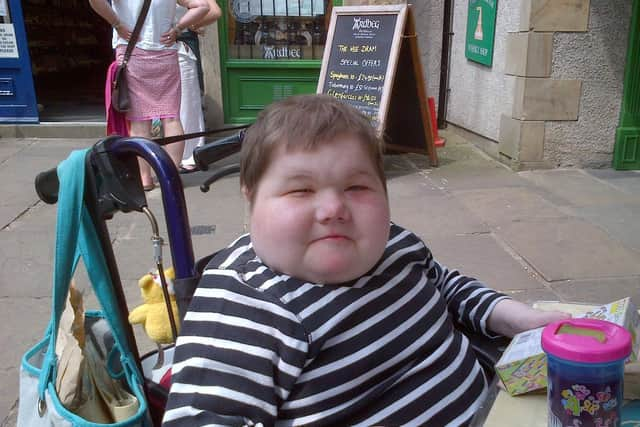Young disabled woman 'starved to death' after being admitted to hospital for routine eye operation, parents say


Patricia and Ken Booth said the premature deaths of people with learning disabilities “has to stop”, after a coroner concluded that neglect contributed to the death of their “Little Miss Sunshine”, Laura Booth, 21, at Sheffield’s Royal Hallamshire Hospital in 2016.
The couple, from Sheffield, said: “This has to stop. It’s not right that learning disabled people die decades prematurely.”
Advertisement
Hide AdAdvertisement
Hide AdDoctors’ inadequate management of Laura Booth’s feeding at the Royal Hallamshire Hospital was a “gross failure of her care”, assistant coroner Abigail Combes said, as she concluded that clinicians’ lack of compliance with the Mental Capacity Act was “unlawful”.


Mr and Mrs Booth told the inquest how doctors ignored their daughter and excluded them from decision-making after she was admitted in September 2016.
The couple received an apology from the coroner for having to fight for an inquest into their daughter’s death, on October 19 2016.
On Monday, Ms Combes ruled: “I am satisfied that the decision not to adequately manage Laura’s nutrition was a gross failure of her care.”
Advertisement
Hide AdAdvertisement
Hide AdIn a narrative conclusion, Ms Combes said: “Among other illnesses, she also developed malnutrition due to inadequate management of her nutritional needs. Her death was contributed to by neglect.”
Ms Combes concluded that the hospital had acted “unlawfully” in the decisions it made about Ms Booth’s feeding, and said she remained “gravely concerned” about senior doctors’ understanding of the Mental Capacity Act.
The coroner said she felt Ms Booth’s parents “were completely excluded from decisions, if indeed there were decisions, made about Laura’s nutritional status during her admission”.
Ms Combes said she would give up her own time, if necessary, to help train staff at the hospital.
Advertisement
Hide AdAdvertisement
Hide AdTurning to Mr and Mrs Booth, who were watching proceedings remotely from their home, she also apologised for failings in the coronial service which left them having to fight for an inquest.
The coroner said she would be writing to the chief coroner to urge better training for coroners on the Mental Capacity Act and Liberty Protection Safeguards.
Ms Combes said she was “going to be bold” and invite Mr and Mrs Booth to help her draft these recommendations.
She told the couple: “Probably the hardest but most important bit, Mr and Mrs Booth, is to try and put into words the admiration I have got for you.”
Advertisement
Hide AdAdvertisement
Hide AdMs Combes said Mr and Mrs Booth were completely devoted to their daughter “who lived her life to the full”.
Ms Booth was diagnosed, after she was born, with partial trisomy 13, and had a number of different life-limiting complications, including learning disabilities.
In their statement, the couple said: “We feel that Laura starved to death and the staff did not listen to us. We also feel like no-one was co-ordinating Laura’s care or making decisions.”
They said doctors, dieticians and pharmacists could not agree on Ms Booth’s feeding, adding: “No-one listened to Laura, or to us, as experts in Laura.”
Advertisement
Hide AdAdvertisement
Hide AdMr and Mrs Booth said: “No-one seems to understand that the risks of not feeding Laura meant that she was starving, as she died in front of us. We cannot tell you how painful that is to live with.”
Mr and Mrs Booth said: “The sun went out of our lives when Laura died, she was our Little Miss Sunshine.”
Dan Scorer, head of policy and public affairs at the learning disability charity Mencap, said: “It is appalling in this day and age that anyone should die of causes including malnutrition. That this took place while Laura was in hospital under the care of medical staff is profoundly shocking. Laura’s death is further evidence of institutional discrimination against people with a learning disability within the NHS.”
Mr Scorer said: “ As the coroner stated, it is clear there needs to be a much better understanding of the Mental Capacity Act amongst all healthcare professionals. If the right training is provided and clinicians adhere to the law, lives will be saved.”
Advertisement
Hide AdAdvertisement
Hide AdKirsten Major, chief executive of Sheffield Teaching Hospitals NHS Foundation Trust said: “Laura was an exceptional individual who has left a deep impression on all who met her. She was gravely ill with sepsis and this was the cause of her death, but we acknowledge that the decisions on the best method of feeding her were a contributory factor to the timing of her death.
"Laura was not starved during her stay and our staff worked hard to try and do what they thought was the right thing. However, our processes at the time were not robust enough which meant that there was not clear decision making and consequently, Laura and her family were let down.
"We regret what happened and we have already overhauled our nutrition service and processes so there is now a clear lead decision maker to review and expedite actions for patients with complex nutritional needs. We are truly sorry for what happened, and we will be responding to all of the Coroner’s recommendations to prevent this situation happening again.”
Comment Guidelines
National World encourages reader discussion on our stories. User feedback, insights and back-and-forth exchanges add a rich layer of context to reporting. Please review our Community Guidelines before commenting.